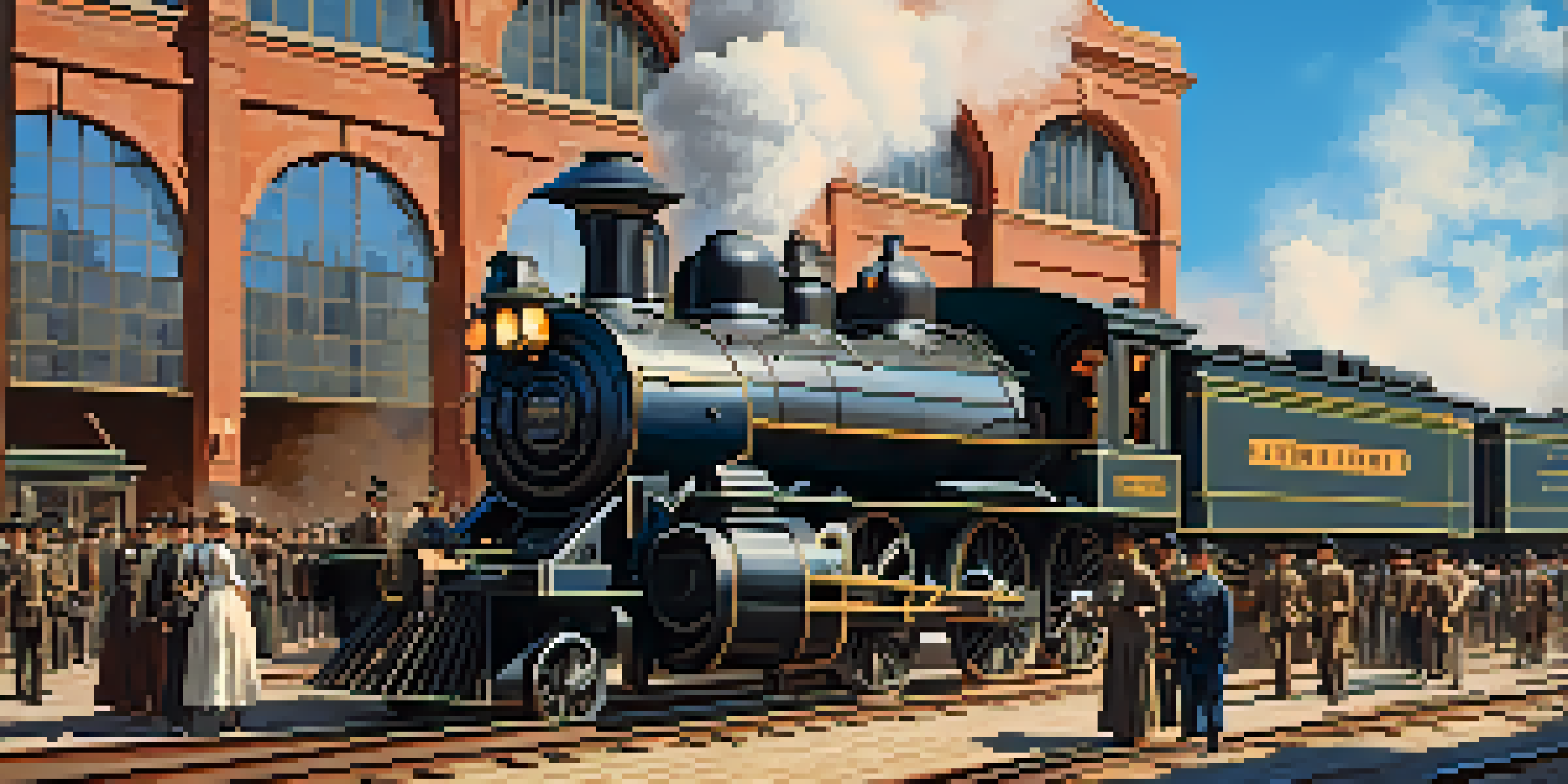Railroads and Atlanta: The Lifeline of the Confederacy

The Importance of Railroads to the Confederacy
During the Civil War, railroads became the arteries of the Confederacy, essential for transporting troops, supplies, and equipment. With limited resources, the South relied heavily on rail networks to sustain its military efforts. This reliance was particularly acute in Atlanta, which emerged as a critical transportation hub.
The railroads are the arteries of the nation, vital for its survival and prosperity.
The convergence of several major rail lines in Atlanta allowed for efficient movement across the Southern states. This geographic advantage meant that supplies could be shuttled quickly to the front lines, giving Confederate forces a crucial edge in certain battles. A well-oiled railroad system was vital for maintaining morale and strength within the ranks.
As the war progressed, the significance of railroads only deepened. Commanders recognized that controlling these lines was tantamount to controlling the war itself. The South's ability to mobilize and supply its armies hinged on its rail infrastructure, making it a lifeline that would prove pivotal in the conflict.
Atlanta: The Rail Hub of the South
Atlanta's strategic location made it a key rail hub during the Civil War. With multiple lines converging in the city, it became the nerve center for Confederate logistics. This centrality not only facilitated troop movements but also ensured that essential goods could be routed efficiently to where they were needed most.

The bustling activity in Atlanta reflected its importance as a military supply center. Railroads running through the city connected it to various fronts, allowing for rapid deployment of reinforcements. As a result, Atlanta often served as the launching point for many Confederate campaigns, underscoring its strategic significance.
Railroads: Lifeline of the Confederacy
During the Civil War, railroads were crucial for the Confederacy, enabling rapid transportation of troops and supplies.
However, this importance also made Atlanta a target. The Union forces recognized the need to disrupt Confederate supply lines, leading to intense battles aimed at seizing control of the city. The fight for Atlanta was not just about territory; it was about controlling the very lifeline that fed the Confederacy.
The Role of Railroads in Military Strategy
Railroads played an integral role in shaping military strategies for both the Confederacy and the Union. For the Confederates, maintaining control over rail lines was crucial for their operational success. Commanders had to devise strategies that leveraged their railroads while also anticipating Union attempts to sever these connections.
Transportation is the backbone of any military campaign; without it, armies are merely a collection of men.
The ability to transport troops rapidly to critical points allowed Confederate leaders to execute surprise maneuvers. This mobility was a game changer in several battles, where time and speed were of the essence. The strategic use of railroads helped the South maintain a semblance of strength, even as resources dwindled.
Conversely, the Union recognized that disrupting Confederate railroads could cripple their adversary. This led to targeted campaigns aimed at destroying key rail infrastructure, which would ultimately hinder the South's war efforts. The battle for control of railroads was a constant tug-of-war that shaped the broader conflict.
Challenges Faced by Confederate Railroads
Despite their importance, Confederate railroads faced numerous challenges throughout the war. Limited resources meant that maintaining and expanding the rail network was a daunting task. The South struggled with a shortage of materials and skilled labor, which hampered their ability to repair and upgrade existing lines.
As the war progressed, destruction from battles and raids further complicated transportation efforts. Union forces often targeted railroads, leading to significant disruptions and delays in supply shipments. Each damaged rail line represented not just a loss of infrastructure, but also a blow to the Confederate war effort.
Atlanta: Strategic Rail Hub
Atlanta's central location made it a vital military supply center, directly impacting Confederate logistics and campaign effectiveness.
Additionally, the lack of a unified command over the railroads led to inefficiencies. Different Confederate generals often made decisions that conflicted with one another, resulting in missed opportunities. These challenges underscored the fragility of the Confederate supply chain and its reliance on railroads.
The Impact of Railroads on Civilian Life
The railroads didn’t just affect military operations; they also had a profound impact on civilian life in the South. As troops and supplies moved through cities like Atlanta, local populations were often called upon to support the war effort. This included providing food, labor, and other essentials to sustain the military.
For many Southerners, the railroads became a symbol of hope and resilience. They represented not only the strength of the Confederacy but also the interconnectedness of communities. However, as the war dragged on, the civilian population faced increasing hardships due to shortages and the constant threat of Union attacks.
The dual use of railroads for military and civilian purposes created a complex dynamic. While they facilitated the movement of goods and people, they also brought destruction and disruption. The presence of railroads in everyday life was a constant reminder of the war’s far-reaching consequences.
The Decline of Confederate Railroads
As the war neared its conclusion, Confederate railroads began to show signs of decline. Continuous attacks from Union forces severely damaged the infrastructure, making it increasingly difficult to maintain operations. This deterioration had a cascading effect on the supply chain, leading to shortages that crippled Confederate armies.
Moreover, the lack of resources to repair and upgrade rail lines further exacerbated the situation. As the Union forces advanced, many railroads fell into enemy hands, leading to a significant loss of mobility for the Confederates. The once-thriving network became a shadow of its former self, unable to meet the demands of a faltering war effort.
Decline of Railroads and Defeat
As the war progressed, the deterioration of the Confederate rail system significantly contributed to the South's inability to sustain its military operations.
The decline of the railroads symbolized the overall weakening of the Confederacy. As supply lines were severed and connections lost, the ability to sustain military operations diminished. Ultimately, this decline played a crucial role in the South's defeat, highlighting the essential nature of railroads in wartime logistics.
Legacy of Railroads in Post-War Atlanta
After the Civil War, railroads remained a vital part of Atlanta's recovery and growth. The rebuilding of the rail infrastructure was crucial in revitalizing the economy of the city and the South as a whole. Railroads facilitated trade and movement, helping to connect communities that had been devastated by the war.
Atlanta's experience as a rail hub during the war positioned it for future prosperity. The city became a critical junction for commerce, drawing businesses and investments. This legacy of railroads contributed to Atlanta's development into a major metropolitan area in the years that followed.

Moreover, the historical significance of railroads in the Civil War remains a point of interest for many. They serve as a reminder of how transportation shaped not only military outcomes but also the social and economic fabric of the South. The story of railroads in Atlanta illustrates the lasting impact of infrastructure on a region's identity and recovery.